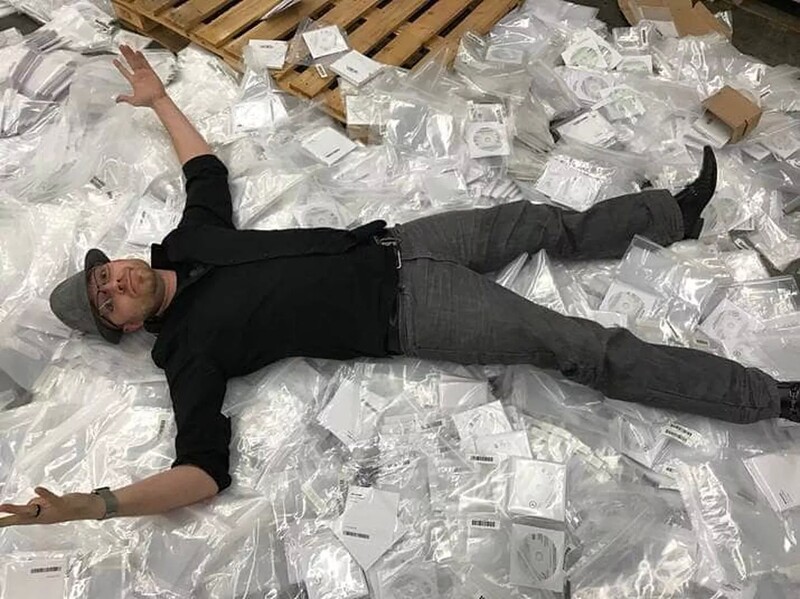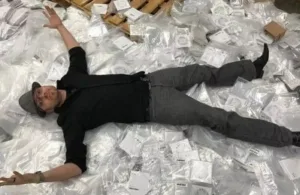Big hat tip to the Washington Post and Seattle Times for this one, and if any US-based readers can help with this case you know what to do.
Eric Lundgren is currently facing a 15 month prison sentence and a $50,000 fine for upsetting Microsoft, but let’s begin at the beginning.
To Begin at the Beginning
Eric grew up in small town Washington State, where he began his career in e-waste recycling after the local Sheriff’s Office discovered his talent for fixing computers, and at the age of 19 he moved to Los Angeles to turn his talent into a business, and his big break came when his company, IT Asset Partners, landed American Airlines as its first major client. But Eric’s interest didn’t stop there, he then moved to China to learn more about how the e-waste the US exports is recycled there, and he later became involved with projects to clean up e-waste recycling in China and Ghana, and an initiative to repair and donate over 14,000 mobile phones and $100,000 to ‘Cellphones for Soldiers’ to benefit US soldiers deployed overseas. But it was his time in China that led him to the idea that has now landed him in court.
Eric realised that one of the barriers to encouraging people to recover and recycle old computers, and to buy refurbished ones, is that they rarely come with the recovery disks they were originally sold with. Unfortunately, where Eric saw an opportunity to do something good, Microsoft’s lawyers saw an opportunity to scare off the little guys.
Working with a Chinese partner, all Eric did was to manufacture and import 28,000 recovery disks, to be sold to refurbishers for $20 a pop. To be clear here, the software itself is free to download from Microsoft’s website and cannot be used for installing a new (free) copy of Windows on any PC. For a recovery disk to work it first has to ping the motherboard and then Microsoft’s servers to ensure that the PC itself has a Windows licence attached to it, and that that licence hasn’t been transferred to another machine. Assuming it passes both tests the software determines that the computer is still covered by the licence paid for by the original owner and installs Windows. This is no more a case of piracy than selling a computer with the original recovery disk, but of course Microsoft, which also sells new licences (not disks) to refurbishers for $25, doesn’t get a second cut of the meagre profits.
 Eric Lundgren lying on the pile of CDs that he bought. Image:Eric Lundgren
Eric Lundgren lying on the pile of CDs that he bought. Image:Eric Lundgren
Unfortunately Eric’s big mistake was to get the disks manufactured with labels described as “near identical” to those used by Dell, and of course including the Dell and Microsoft logos, and no one spots a case of potential case of copyright infringement faster than a lawyer in the tech industry. (as another publisher of display news, Mark Fihn of Veritas and Visus has found!)
So Microsoft complained to the government and the government agreed, indicting Eric on 21 counts and putting him up against a claim for lost earnings of $420,000 from Microsoft, despite the fact that the disks were never actually sold and the software itself was free. It’s not hard to see the game being played here, and the Seattle Times reports that Eric claims that the assistant U.S. Attorney on the case told him,
“Microsoft wants your head on a platter and I’m going to give it to them”.
 Fortunately, District Judge Daniel T.K. Hurley (pictured) ruled against Microsoft’s claim for damages for the profits it wouldn’t have made, but still fined Eric $50,000 and passed a sentence of 15 months, reduced from the federal guidelines of 36 to 47 months, with the judge admitting it was a hard case to try. This was on the basis that the 28,000 disks were judged to have a had a potential value of $700,000 – so using Microsoft’s value, not Eric’s intended sale value – and Eric is only currently free after the US Court of Appeals for the 11th Circuit ruled at the last minute that he could remain so whilst his appeal is pending.
Fortunately, District Judge Daniel T.K. Hurley (pictured) ruled against Microsoft’s claim for damages for the profits it wouldn’t have made, but still fined Eric $50,000 and passed a sentence of 15 months, reduced from the federal guidelines of 36 to 47 months, with the judge admitting it was a hard case to try. This was on the basis that the 28,000 disks were judged to have a had a potential value of $700,000 – so using Microsoft’s value, not Eric’s intended sale value – and Eric is only currently free after the US Court of Appeals for the 11th Circuit ruled at the last minute that he could remain so whilst his appeal is pending.
Now in fairness to Microsoft (and Dell, but then they appear not to be parties, and if so that’s another good reason to buy your PCs from them) it’s hard to argue against the claim for copyright infringement. But if overlooking the reproduction of a logo as part of an initiative to mitigate the federal government’s greater crime of failing to tackle it’s e-waste problem merits 15 months in jail then to put it bluntly the US is one very f***ed up country – and before anyone attacks me for that I’m well aware that in many ways the UK’s laws are worse.
Ok, fine the guy, but then throw that out of court on the basis that Microsoft’s lawyers are behaving like ambulance chasers and wasting the court’s time – let’s not forget that had those disks just had ‘recovery disk’ scribbled on them then the case could never have got to court in the first place. Then why not go further and give them away free to refurbishers and the proviso that they give them away free to their customers too?
What is Reasonable in Planned Obsolescence?
I’ve covered planned obsolescence before and this case tests the boundaries of what should be considered reasonable practice. Microsoft is totally within its rights to stop supporting old software and to help fight the spread of viruses and malware by ‘encouraging’ users to upgrade. But conversely its business model relies on driving sales of new PCs to sell better, but more power-hungry, software, and this serves to drive in the turnover of machines that end up as perfectly recoverable electronic ‘waste’. So, so what if a little guy comes along and spots an opportunity to do a bit of good for society, even at a minimal profit, by selling something that Microsoft should reasonably be selling to refurbishers at cost price? This would, presumably, still be a lot less costly than continuing to support older versions of their software until they become as rare as a Vista enthusiast at tech conference. They might be technically on the right side of the law here, but in this case “the law is an ass”.
Eric’s counter claim is that Microsoft’s expert witness, John McGloin, a program manager from Ireland, as he put it,
“testified that a free restore CD was worth the same price as a new Windows operating system with a licence. … This was false and inaccurate testimony provided by Microsoft in an attempt to set a precedent that will scare away future recyclers and refurbishers from reusing computers without first paying Microsoft again for another license.”
Eric’s own expert witness, Glenn Weadlock, an expert and author who had previously testified for the government in a 2001 anti-trust case against Microsoft, testified that without a product key or Certificate of Authenticity the value of the disks was limited to the “convenience factor” and that their real value is “zero or near zero”.
So this is one of those rare occasions where I am genuinely asking for help from our readers. Eric’s LinkedIn page is at: https://www.linkedin.com/in/itassetpartners/ – for what it’s worth I’ve sent him a message of support so he might appreciate some more, but I’m just a lowly academic here in the UK and there must be something one of you out there could do that could make more of a difference?
We will, of course, keep you posted on this, and wish Eric all the best of luck in staying free and keeping up his valuable work. I’ll leave the final words to Eric, who somehow found the time to reply:
“Transparency is the key to truth. My purpose is to help people, I want society to reward efficient practices rather than those that are wasteful. If someone wants to put “Profit” before the best interest of “People” well… I will look for a way to turn their lemons into lemonade. :)”
 Eric Lundgren with a car built out of 90% consumer waste by weight, in October 2017 in Fontana, Calif. (Image:Bobby Quillard)
Eric Lundgren with a car built out of 90% consumer waste by weight, in October 2017 in Fontana, Calif. (Image:Bobby Quillard)
RoHS update
After writing our main article it’s not easy to get back to business as usual reporting, but the new RoHS Directive is looming on the horizon so it’s time for an update.
As ever, the scope has been widened, and the number of devices exempted under the usual relaxation for medical devices and monitoring and control instruments will be reduced further, with full details due in the next few months.
In addition, some exemptions will reach their planned expiry dates, including such as exemption 39-B – “Cadmium in downshifting cadmium based semiconductor nanocrystal quantum dots for use in display lighting applications (< 0.2 μg Cd per mm2 of display screen area)” – which expires on June 30th, 2018.
But perhaps the biggest change, reflected in this being the point at which RoHS 2 becomes RoHS 3 (Directive 2015/863), is the addition of four new phthalates: Bis(2-ethylhexyl) phthalate (DEHP); Benzyl butyl phthalate (BBP); Dibutyl phthalate (DBP); and Diisobutyl phthalate (DIBP). These are covered for homogeneous materials as of July 22nd 2019, but the typical exemptions for medical devices and monitoring and control equipment will apply to them until July 22nd 2021.
We’ll cover the full details as soon as they’re released and, as ever, you have been warned.
Dr Keith J. Baker

